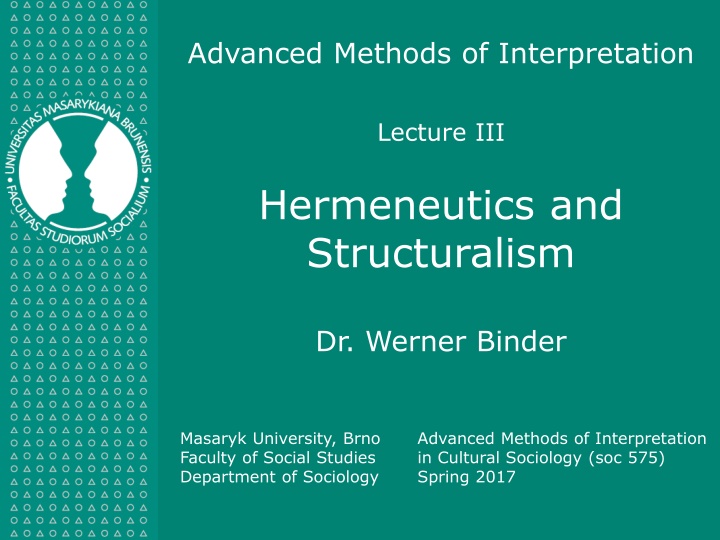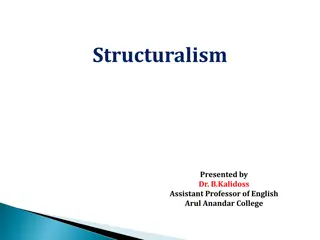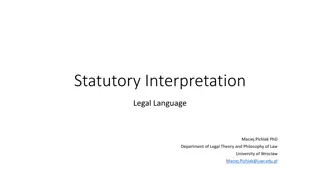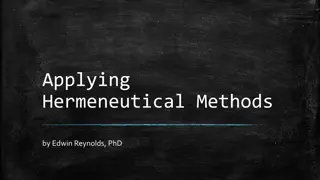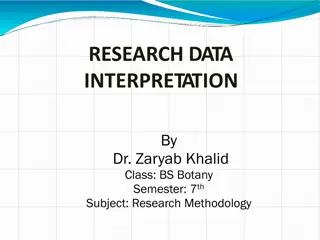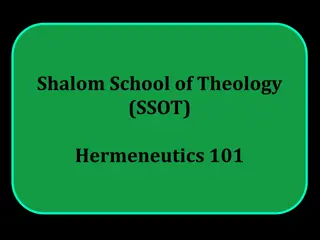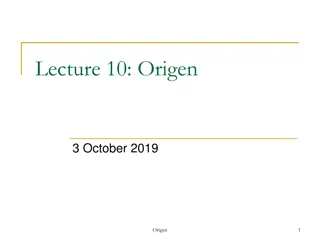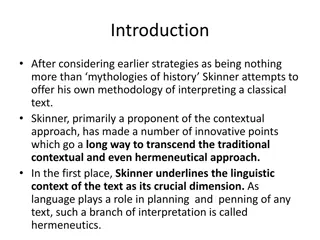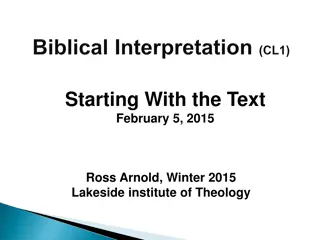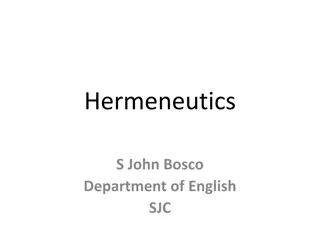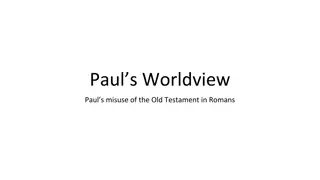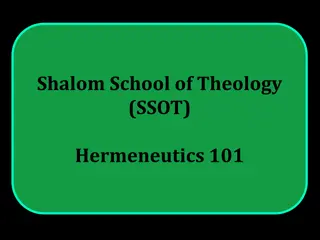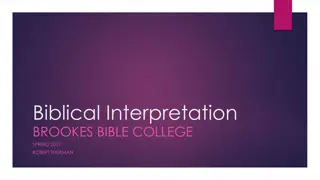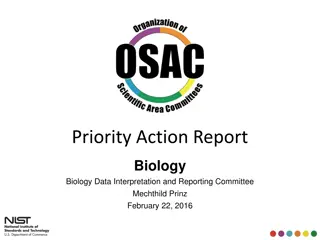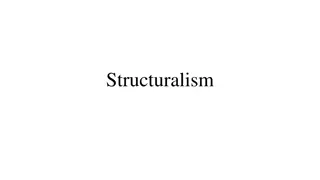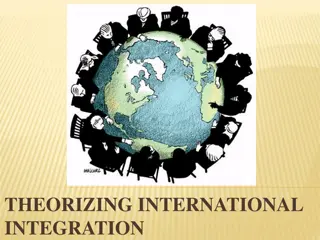Advanced Methods of Interpretation: Hermeneutics and Structuralism Lecture at Masaryk University
Understanding interpretation in cultural sociology through hermeneutics and structuralism is explored in Lecture III by Dr. Werner Binder at Masaryk University. The lecture delves into the art of interpretation, focusing on classical hermeneutics, Friedrich Schleiermacher's romantic hermeneutics, and the significance of non-understanding as the foundation of hermeneutics. Key points include the connection between interpretation and data analysis, the nature of interpretations, and the shift towards subjective understanding in the field of sociology.
Download Presentation

Please find below an Image/Link to download the presentation.
The content on the website is provided AS IS for your information and personal use only. It may not be sold, licensed, or shared on other websites without obtaining consent from the author.If you encounter any issues during the download, it is possible that the publisher has removed the file from their server.
You are allowed to download the files provided on this website for personal or commercial use, subject to the condition that they are used lawfully. All files are the property of their respective owners.
The content on the website is provided AS IS for your information and personal use only. It may not be sold, licensed, or shared on other websites without obtaining consent from the author.
E N D
Presentation Transcript
Advanced Methods of Interpretation Lecture III Hermeneutics and Structuralism Dr. Werner Binder Masaryk University, Brno Faculty of Social Studies Department of Sociology Advanced Methods of Interpretation in Cultural Sociology (soc 575) Spring 2017
Masaryk University Faculty of Social Studies Summary of Lecture II 1. Interpretation as method of data analysis in interpretative and cultural sociology 2. An interpretation can never be proven to be true , however, good interpretations are adequate, consistent, plausible, elegant and interesting 3. Interpretation follows abductive reasoning: Devise a theoretical framework or hypothesis that explains observable surprising facts werner.binder@mail.muni.cz
Masaryk University Faculty of Social Studies What is Hermeneutics? The art of interpretation of texts A general theory of understanding A specific paradigm in interpretative sociology Classical Hermeneutics: Interpretation of legal or sacred texts (e.g. Medieval biblical exegesis Renaissance: Understanding classical texts Protestantism: Shift from dogma to interpretation werner.binder@mail.muni.cz
Friedrich Schleiermacher (1786-1834)
Masaryk University Faculty of Social Studies Schleiermacher: Romantic Hermeneutics Romanticism: individuality and genius esthetics Shift from the objective meaning of sacred and legal texts to the subjectivity of authors (psychological) The goal of hermeneutics: Understanding the author better than he did understand himself (deep analysis) Grammatical vs. psychological interpretation Divinatory character of interpretation (guessing) Non-understanding as the beginning of hermeneutics werner.binder@mail.muni.cz
Non-Understanding as the Starting Point for Hermeneutics Hermeneutics rests on the fact of the non- understanding of discourse: taken in its most general sense, including misunderstanding in the mother tongue and everyday life. Friedrich Schleiermacher, General Hermeneutics (1809/1810)
Wilhelm Dilthey (1833-1911)
Masaryk University Faculty of Social Studies Dilthey s Hermeneutics I Historicism of the 19thcentury, Lebensphilosophie Erkl ren vs. Verstehen epistemological and methodological foundations of the cultural sciences Hermeneutics: Shift from psychological understanding to a social and cultural conception of hermeneutics Life can be experienced subjectively, but expresses and objectifies itself in artifacts, institutions and culture The goal of hermeneutic interpretation is the understanding of culture as objectification of life werner.binder@mail.muni.cz
Masaryk University Faculty of Social Studies Dilthey s Hermeneutics II Through sympathetic participation and interpretation of cultural objectifications, understanding is possible Meanings of individuals and cultures are organized as systems Weltanschauung (world-view) In order to understand, we have to fall back on our experiences (and world-view) Culture as historically determined horizon of meaning (Weltanschauung, Zeitgeist) Sociological thinking: Subjective experiences are shaped by social influences werner.binder@mail.muni.cz
Masaryk University Faculty of Social Studies Case Study: Weber s Protestant Ethic Surprising (though widely discussed) fact: Correlation between modern capitalism and Protestantism Capitalism and the problem of primitive accumulation Marx: primitive accumulation by force and fraud B hm-Bawerk: primitive accumulation by ascetic virtues (capital as surplus that is not consumed) Weber: Historical, moral and cultural conditions ( this- worldly asceticism ) of the emergence of capitalism Starting point of his hermeneutic interpretation: Autobiography of Benjamin Franklin werner.binder@mail.muni.cz
Benjamin Franklin I Remember, that time is money. He that can earn ten shillings a day by his labour, and goes abroad, or sits idle, one half of that day, though he spends but sixpence during his diversion or idleness, ought not to reckon that the only expense; he has really spent, or rather thrown away, five shillings besides. In: Max Weber (2001: 14, emphasis by me)
Benjamin Franklin II Remember, that money is of the prolific, generating nature. Money can beget money, and its offspring can beget more, and so on. Five shillings turned is six, turned again it is seven and three pence, and so on, till it becomes a hundred pounds. The more there is of it, the more it produces every turning, so that the profits rise quicker and quicker. He that kills a breeding sow, destroys all her offspring to the thousandth generation. He that murders a crown, destroys all that it might have produced, even scores of pounds. In: Max Weber (2001: 15, emphasis by me)
Masaryk University Faculty of Social Studies Weber s Protestant Ethic The sprit of capitalism , as Weber s interpretation shows, is an ethos and not the mere exercise of instrumental rationality Maximization of profit as an irrational behavior that needs to be explained by social and normative forces Hypothesis: There is an affinity between the spirit of capitalism and the protestant ethic werner.binder@mail.muni.cz
Masaryk University Faculty of Social Studies The Protestant Ethic Lutheranism: Rehabilitation of worldly life, profession or calling ( Beruf ) as religious and moral obligation Ascetic Protestantism (Calvinism, Puritanism, Pietism): Milton s Paradise Lost , Westminster Confession of 1647 , Bunyan s Pilgrim s Progress , Baxter s Saints Everlasting Rest , Defoe s Robinson Crusoe Predestination of salvation Subjective insecurity of salvation professional success as sign, as indicator of salvation rationalization of everyday life Spirit of capitalism as secularized protestant ethic werner.binder@mail.muni.cz
From Protestant Ethic to Capitalism The Puritan wanted to work in a calling; we are forced to do so. For when asceticism was carried out of monastic cells into everyday life, and began to dominate worldly morality, it did its part in building the tremendous cosmos of the modern economic order. This order is now bound to the technical and economic conditions of machine production which to-day determine the lives of all the individuals who are born into this mechanism, not only those directly concerned with economic acquisition, with irresistible force. Perhaps it will so determine them until the last ton of fossilized coal is burnt. In Baxter s view the care for external goods should only lie on the shoulders of the saint like a light cloak, which can be thrown aside at any moment . But fate decreed that the cloak should become an iron cage. Max Weber (2001: 123)
Masaryk University Faculty of Social Studies Heidegger: Existential Hermeneutics Understanding as existential and ontological faculty that makes the world accessible practical reason Understanding something presupposes that something is already understood (prejudice, hermeneutic circle) Interpretation, the explication of meaning, is only one specific form of understanding that is based on the existential and practical faculty werner.binder@mail.muni.cz
Masaryk University Faculty of Social Studies Gadamer: Truth and Method Hermeneutics: From the intention of the author to the objective meaning of the text Surplus of meaning infinite process of interpretation Understanding the other as a fusion of horizons Interpretation as historically situated reception historically effected consciousness Rehabilitation of prejudice and tradition Interpretation is finding out the question to which the text the answer is werner.binder@mail.muni.cz
The Cultural Logic of the Question Thus a person who wants to understand must question what lies behind what is said. He must understand it as an answer to a question. If we go back behind what is said, then we inevitably ask questions beyond what is said. We understand the sense of the text only by acquiring the horizon of the question a horizon that, as such, necessarily includes other possible answers. Thus the meaning of a sentence is relative to the question to which it is a reply, but that implies that its meaning necessarily exceeds what is said in it. As these considerations show, then, the logic of the human sciences is a logic of the question. Gadamer (2003: 363)
Masaryk University Faculty of Social Studies Ricoeur Ricoeur s starting point: Psychoanalysis and the problem of a phenomenology of religion Double-meaning of the symbol a symbol is a sign that has an additional meaning interpretation An interpretation of religion can start with belief or with doubt and comes to different results Hermeneutics of listening vs. hermeneutics of suspicion (Marx, Nietzsche, Freud) Causal explanation as reduction? genesis vs. validity werner.binder@mail.muni.cz
Masaryk University Faculty of Social Studies Conflict of Interpretations Ricoeur (1970) Interpretation as Recollection of Meaning Interpretative stance Interpretation as reconstruction Object of interpretation Authors Gadamer, Ricoeur Interpretation as Exercise of Suspicion Critical, iconoclastic, subversive Reduction, explanation, deconstruction Idol, ideology, false consciousness Marx, Nietzsche, Freud Affirmative Description, Symbol, truth werner.binder@mail.muni.cz
Cultural Sociology as Social Psychoanalysis The secret to the compulsive power of social structures is that they have an inside. They are not only external to actors but internal to them. They are meaningful. These meanings are structured and socially produced, even if they are invisible. We must learn how to make them visible. For Freud, the goal of psychoanalysis was to replace the unconscious with the conscious: Where Id was, Ego shall be. Cultural sociology is a kind of social psychoanalysis. Its goal is to bring the social unconscious up for view. To reveal to men and women the myths that think them so that they can make new myths in turn. Jeffrey Alexander (2003: 4)
Masaryk University Faculty of Social Studies What is Structuralism? Structuralism is one of the most influential intellectual movements of the 20th century (centered in Europe) In contrast to hermeneutics, structuralism aimed to make humanistic disciplines more scientific Though structuralism was widely criticized, it had a strong influence on critics such as Michel Foucault and Pierre Bourdieu Structuralism developed out of a strong reading of certain passages in Saussure s lectures on linguistic werner.binder@mail.muni.cz
Ferdinand de Saussure (1857 1913)
Masaryk University Faculty of Social Studies Saussure: Language as a System Langue , language as a system, is a part of langage , the human speech Langue vs. parole (speaking, speech act, discourse) Language is a system and social fact par excellence Speaking is individual and accidental: individuals use the language code to express their own thoughts Synchronic vs. diachronic analysis of language (structuralism put a strong emphasis on the former) werner.binder@mail.muni.cz
Masaryk University Faculty of Social Studies Saussure: The Linguistic Sign I The linguistic sign consists of the signifier (concept) and the signified (sound image): Diagram by Wendell Piez werner.binder@mail.muni.cz
Masaryk University Faculty of Social Studies Saussure: The Linguistic Sign II Arbitrariness of the linguistic sign: unmotivated, based on convention, fixed by rule Linearity of the linguistic signifier: language is sequentially structured, in contrast to images etc. Immutability of the sign as a result of its arbitrariness: the social force and inherent conservatism of language Mutability of the sign as a result of its arbitrariness: individuals can t change language intentionally, only collectives can do so, although mostly unintentionally werner.binder@mail.muni.cz
Masaryk University Faculty of Social Studies Language: Substance and Form A: Continuity of sounds and discontinuity of sound images B: Continuity of psychic states and discontinuity of concepts Conclusion: Language is a form, not a substance werner.binder@mail.muni.cz
Masaryk University Faculty of Social Studies Language as Sign System The meaning of a linguistic sign is determined by it s difference to all other signs in the system of language: Following the linguistic structuralism of Saussure, the structuralist movement applied his ideas to other sign systems (kinship, fashion, discourses etc.) werner.binder@mail.muni.cz
Claude Lvi-Strauss (1908 2009)
Masaryk University Faculty of Social Studies L vi-Strauss: Structural Anthropology L vi-Strauss extended the structuralist approach from language to other systems of meaning: Kinship as a meaning system: exchange of women Economy as a meaning system: exchange of goods Language as a meaning system: exchange of words Myth, food etc Self-proclaimed goal of his structural analysis was to dissolve the concept of man into different systems of meaning (anti-existentialist) werner.binder@mail.muni.cz
Masaryk University Faculty of Social Studies The Semiotics of Food Religious or moral taboos on food (Durkheim, Douglas, Barthes) dogs and horses (cf. Sahlins) Synchronic (Chinese) vs. diachronic (French) food arrangements (cf. Levi-Strauss 1974) Syntagmatic relations (e.g. first soup, then main course, cf. Barthes) Paradigmatic relations (e.g. potatoes can be substituted by rice or noodles but not in every dish) werner.binder@mail.muni.cz
Masaryk University Faculty of Social Studies The Semiotics of Food and Fashion Food and/or drinks cannot be combined freely: White wine and fish vs. red wine and beef Chips with ketchup (American), mayonnaise (Belgian) and vinegar (British) The same is true for the system of fashion (cf. Barthes): Combination of styles or colors Garment taboos (e.g. socks and sandals) werner.binder@mail.muni.cz
Masaryk University Faculty of Social Studies Structuralism and Poststructuralism Commonalities: Culture as collective unconsciousness Decentering the subject Divergences: Poststructuralism rejects the a-historical universalism and scientific objectivism of structuralism Poststructuralism questions the validity of definitive interpretations (closure) Cf. Smith 2001: 118ff. werner.binder@mail.muni.cz
Masaryk University Faculty of Social Studies (Early) Foucault: Neostructuralism Discourse analysis and archaeology of knowledge Fields of knowledge and scientific discourses are structured by unconscious principles ( episteme ) History as a process of discontinuities and ruptures The history of the human sciences is characterized by two ruptures (17thand beginning 19thcentury) Not only empirical subjects, but also the concept of man is a historical and discursive product (thus, structural anthropology loses its universality) werner.binder@mail.muni.cz
Masaryk University Faculty of Social Studies Derrida: Poststructuralism Critical deconstruction instead of objective analysis The linguistic starting point, the human speech, is replaced by writing and the notion of a cultural text (against a metaphysics of presence ) Binary oppositions (e.g. nature/culture), and meanings in general, are never stable Center and periphery: The center tries to stabilize signs and meanings, at the periphery is room for play Interpretation as analysis vs. interpretation as play werner.binder@mail.muni.cz
Masaryk University Faculty of Social Studies Castoriadis: Antistructuralism There exists a meaning that can never be given independently of every sign but which is something other than the opposition of signs, and which is not unavoidably related to any particular signifying structure since it is [ ] what is invariant when a message is translated from one code into another [ ] It is impossible to hold that meaning is simply what results from the combination of signs. (Castoriadis 1987: 87) Symbolism vs. imaginary significations Language as form vs. magma of the social imaginary werner.binder@mail.muni.cz
Thank you for your attention, criticism and further suggestions! werner.binder@mail.muni.cz
